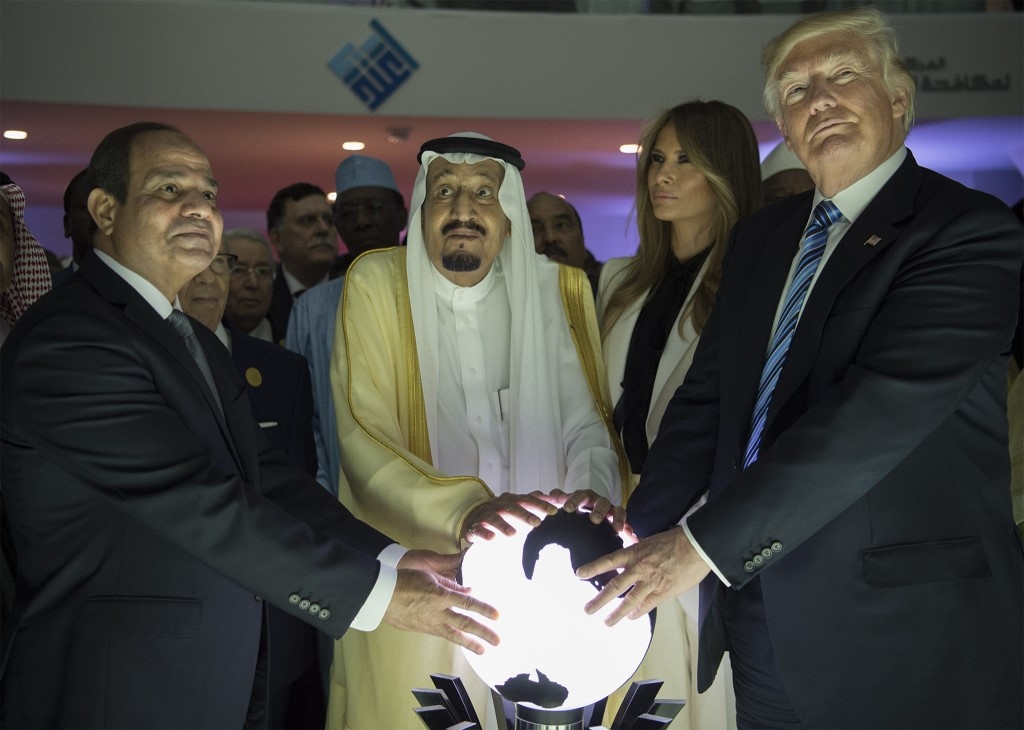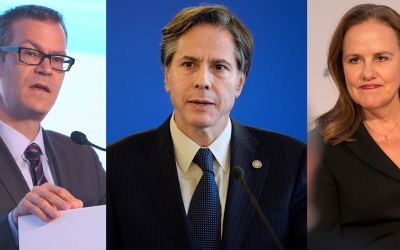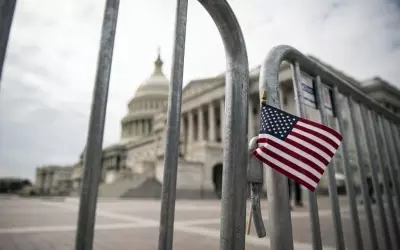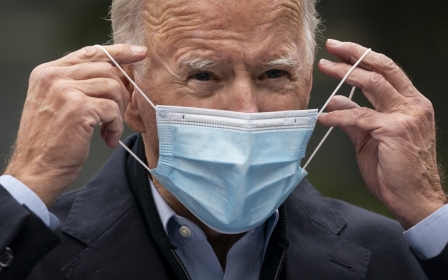Some Middle East leaders have a big stake in US election

While the world is closely watching the US election, the leaders of some Middle East countries have a lot riding on who wins the race for the White House.
Across the region, surveys have shown that the majority of people are dissatisfied with US foreign policy and would favour a Joe Biden victory over President Donald Trump.
New MEE newsletter: Jerusalem Dispatch
Sign up to get the latest insights and analysis on Israel-Palestine, alongside Turkey Unpacked and other MEE newsletters
Michael Robbins, the director of research at the Arab Barometer research institute, said Trump's actions in the region had not aligned with the interests of ordinary people and a change in the Oval Office could help Washington's standing moving forward.
"They [the people] don't agree with the way their leaders have made the deals with Washington for their own interests," Robbins said during a zoom call on Monday arranged by the Brookings Institution.
"If Biden wins, he has a huge task if he wants to go and shape ordinary citizens' opinions of the United States differently."
Here's a look at some world leaders who have a personal stake in the race, with their fortunes depending heavily on the success - or failure - of President Trump.
Israel
Perhaps none has more riding on a Trump victory than Israel's Prime Minister Benjamin Netanyahu.
The Israeli leader, who's had a rocky relationship with President Barack Obama, has praised Trump as "the greatest friend" Israel ever had.
Since Trump was elected to office, he has made numerous concessions to Israel, including recognising Jerusalem as Israel's capital, withdrawing from the Iran nuclear deal and offering a Middle East plan that heavily favours Israel over the Palestinians.
The White House also brokered the establishment of diplomatic ties between Israel and the United Arab Emirates and Bahrain.
But Netanyahu's close relationship with Trump, and more broadly the Republican Party and its evangelical Christian base, has come with a price.
It's undercut Israel's traditional bipartisan support in Washington and alienated many Democrats, especially the rising progressive wing and the largely liberal Jewish-American community.
While Biden, who served as vice president under Barack Obama from 2008 to 2016, has said he's a "stalwart support of Israel", the presidential candidate has also said he would rejoin the nuclear deal if Iran returns to compliance.
Sidelined and humiliated by Trump, the Palestinians have made no secret about their hopes for a Biden victory.
"If we are going to live another four years with President Trump, God help us," Palestinian Prime Minister Mohammad Shtayyeh said last month.
Gulf rulers
Saudi Arabia's King Salman and Crown Prince Mohammed bin Zayed, the de facto ruler of the United Arab Emirates, were no big fans of the Obama administration.
Their countries welcomed Trump's withdrawal from the Iran nuclear deal and the imposition of sanctions that have sent Iran's economy into a freefall.
Trump also stood by Saudi Crown Prince Mohammed bin Salman (MBS) in the face of sharp criticism after the killing of Middle East Eye columnist Jamal Khashoggi by Saudi agents in late 2018.
Trump vetoed a Senate resolution that would have ended US support for the Saudi and UAE-led war in Yemen which has created the world's most devastating humanitarian crisis.
The Gulf monarchs fear that a Biden presidency could be an extension of the Obama era, with renewed engagement with Iran and greater concern for human rights.
The former vice president has previously said he plans to "reassess" Washington's ties with Riyadh, and end US support for the war in Yemen.
Jean-François Seznec, a Middle East expert at the Johns Hopkins School of Advanced International Studies in Washington, told Middle East Eye that some of the Democratic wrath against Riyadh may have been a "cudgel" against Trump, rather than a push to reposition America's stance in the region.
"I think there will be negotiations because neither party, whether the Democrats or Republicans, can afford to ever break with Saudi Arabia, especially when Iran is still and will still be the main enemy of the United States," Seznec said.
Iran
Iran's supreme leader has suffered the equivalent of a diplomatic whiplash between the Obama and Trump administrations.
People crowded the streets to praise the 2015 nuclear deal with world powers, hoping for normalised ties with the West and an ultimate end to international sanctions that had strained the country's finances.
Then, just three years later, Trump's unilateral withdrawal from the deal subsequently led to Iran resuming nuclear activities and a resumption of hard-hitting sanctions.
Tensions ratcheted up in a series of incidents culminating with an Iranian missile attack on US forces in Iraq after an American drone strike killed a top Iranian general.
Biden has said that he's willing to sit back down with Iran if it honors the limits of the nuclear deal. Another Trump term could see tensions again return to a boil.
However, Iran's Supreme Leader, Ayatollah Ali Khamenei, has insisted that the result of the election "will not affect" Tehran's policy towards Washington.
"Our policy... is clearly defined. It does not change with the movement of individuals," he said on Tuesday.
"It does not matter to us who comes and goes."
Egypt
For Egypt, Trump's ascension to the presidency meant Cairo once again had a powerful supporter in the White House.
Under Barack Obama, the US suspended direct military aid in the wake of the Egyptian coup in 2013, including blocking the delivery of Apache attack helicopters, F-16 fighter jets and more than $250m.
That was a major blow for one of the biggest recipients of economic and military aid from Washington.
Trump has instead moved to boost direct aid to Egypt, including seeking $1.4bn for "bilateral assistance" in 2021, much of it for military and security assistance at a time when Egyptian security services are routinely targeting activists and dissidents.
Still, while a Biden presidency may be more vocal about issues of human rights in the country, there may not be much change in the US's approach to Egypt under President Abdel Fattah el-Sisi, as the former vice president will have other areas in foreign policy - such as dealing with China's growing influence - on his agenda.
"I would get the sense that the Egypt-US relationship is sort of on autopilot, and it's no longer the priority used to be for both sides," Adel Abdel Ghafar, a senior fellow with Brookings, said during Monday's virtual call.
"And even from the Egyptian side, looking towards deeper relationships with Russia and China and so on."
Middle East Eye delivers independent and unrivalled coverage and analysis of the Middle East, North Africa and beyond. To learn more about republishing this content and the associated fees, please fill out this form. More about MEE can be found here.







